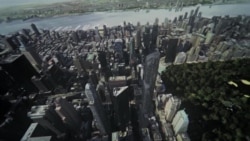Foreign buyers are helping boost skyrocketing prices for high-end condominium apartments in Manhattan, where real estate is still considered a bargain relative to most other financial capitals. Realtors say Canadian, Chinese and Russian buyers make up the bulk of non-U.S. investors in the borough's most expensive neighborhoods.
Slender, glass-clad buildings overlooking Central Park, with just one or two astronomically priced apartments per floor, are the most sought after. At "One57," a 90-story tower on West 57th St. that is still being fitted out, many of the apartments have already sold. Two reportedly went for more than $90 million each.
One57 sales director Jeannie Woodbrey recently showed what she called one of the building's smallest apartments, a 300-square-meter unit priced at nearly $19 million.
"It's a three-bedroom, three-and-a-half bathroom," she said. "The ceilings are 10 ft. 7 in. [3.17 meters], our lowest ceiling height, and Christian de Portzamparc, who was the exterior architect, designed walls of glass, so you really have no break in the views whatsoever, and that's really the drama in all of our apartments."
From the 41st floor, Central Park is laid out like the biggest front lawn in the universe. On higher floors, the apartments seem to float above it. Some interior walls are leather clad. Bathtubs carved from a single slab of marble had to be hauled up on the exterior of the building, Woodbrey said. The building's developers spent two years working with Italian quarries to assemble marble wall panels with matching veins.
About half the new owners are from outside the U.S., Woodbrey said. Nikki Field and Daniel Chang, brokers at Sotheby's International Realty, have sold several apartments in the building. They often travel to China to meet new clients.
"One of the most stunning changes in our industry came about in January 2009," Field said, referring to an International Herald Tribune survey of prices in global capitals.
"They found that Moscow was 36 percent more expensive than London, and Hong Kong was 78 percent more expensive than London. And New York was 17% less expensive than London," Field said. "It didn't take long for our phones to begin to ring."
Some foreign buyers purchase an apartment for a child who is attending college in New York, she said. Others buy multiple U.S. properties, even sight unseen.
For Chinese clients, in particular, Chang said, the U.S.'s secure property laws are a draw.
"I think the U.S. has really a stable political environment. It's kind of [like putting] a safe deposit box in the city that it will pay for itself, it will appreciate, and they don't have to worry about any property being confiscated," he said.
U.S. laws also make it possible to buy real estate anonymously through holding corporations, another attraction for the global super-rich, according to a New York magazine investigation, which calls Manhattan real estate "the new Swiss bank account" and "stash pads in the sky."
In the last few months, Chinese buyers outnumbered Russian purchasers of Manhattan properties for the first time. They now are second only to Canadian owners, such as dual Canadian and American citizen Diane Francis, who has a pied-à-terre down the street from One57. A financial journalist, she wrote in defense of the phenomenon for the New York Post.
"The new mayor of New York seemed to be very anti-investment, thinking prices were going too high, the buildings were getting too high," Francis said. "And I just said, 'Hey, wait a minute, we're the solution, not the problem to your economic issues. We employ people, we spend billions, we invest here, we buy your theater tickets, ride your cabs. Don't call us pied-à-terrorists.’"
Francis notes that by 2020, more than 47 million people around the world will be millionaires, with at least $1 million of net worth beyond the value of their homes.
"We have enough money to go where we want and buy second homes to have fun, or certainly to immigrate permanently, if we want to," she said. "So this money is sloshing around looking for real estate as an investment, as an asset diversification."
Some foreign buyers of U.S. property, she said, "are fleeing regimes that they're concerned about destabilizing, or currencies they're worried about. Or in the case of China, and I don't want to besmirch all the Chinese coming to New York and the U.S. to buy real estate, but there is a crackdown on corruption in China, and a lot of people have hidden away money that they haven't told the government about, and they want to get it out. And they're getting it out by buying a condo here in someone else's name."
One57, or "Oligarch Arms," as Francis dubs it, is now the most expensive residential building in the city, and at 306 meters, the tallest in the Western Hemisphere. But it will soon be overtaken by even taller, equally slender and costly apartment towers going up near Central Park.
To critics, the ultra-luxury apartment towers are a sign of rising inequality, and contribute little to the city. Many are empty most of the year, and owners whose wealth is acquired outside the U.S. don't pay income taxes. High-end new buildings also often receive huge property tax breaks: An apartment at One57 currently listed at $36 million will be taxed under $500 a month.
Even defenders agree the trend is helping to drive up real estate prices throughout the city, making New York increasingly unaffordable for those who are not rich.
The trend may soon accelerate for non-luxury real estate as well, and not only in New York, Francis said. Zillow, a website that lists every U.S. property and its price history, will be published in China in Mandarin beginning this month.
"The Chinese market will explode," Francis said. "People in Beijing will be able to sit down and buy something online, and contact a real estate agent to do it for them remotely."





